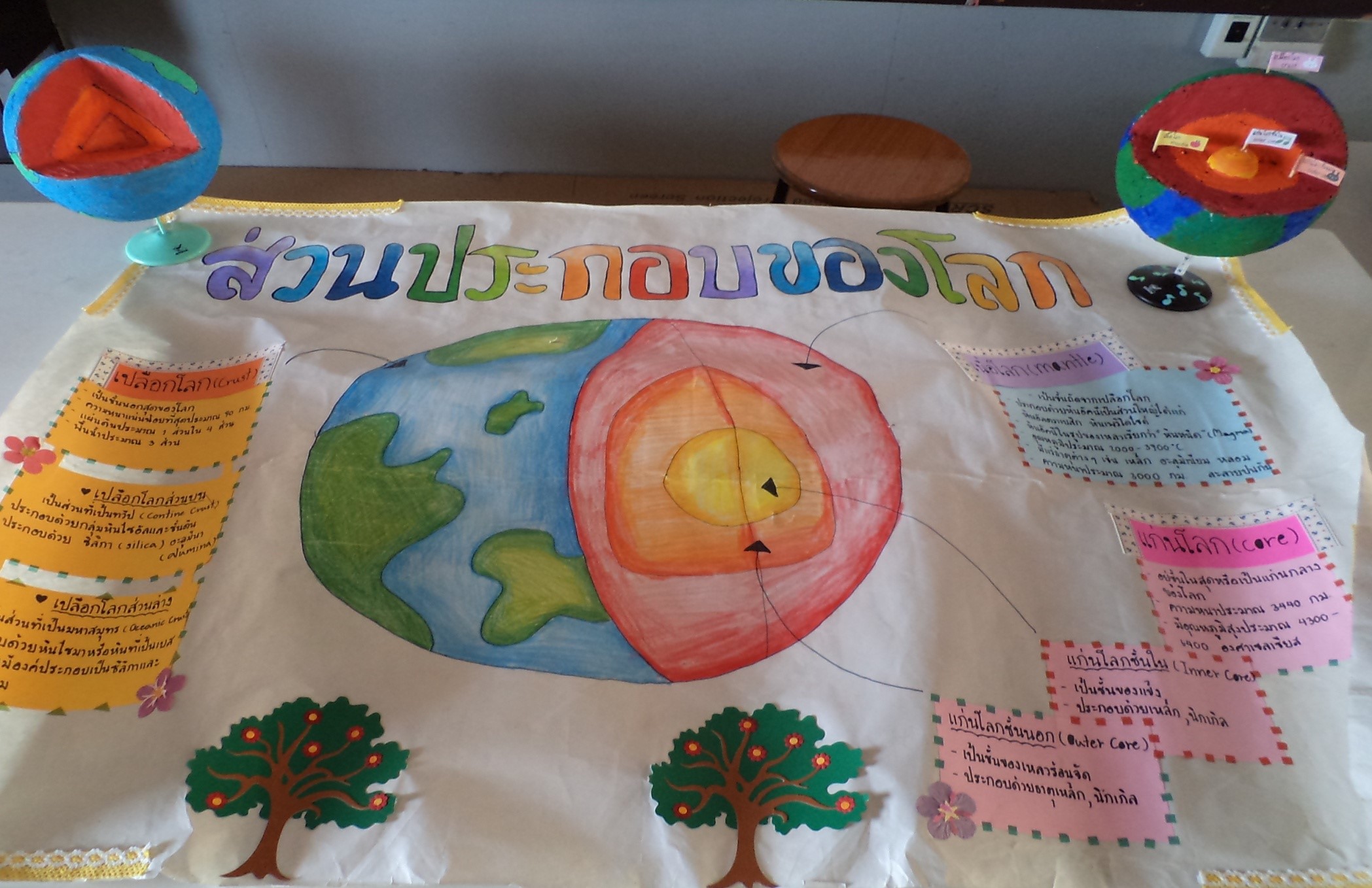การส่งเสริมความเข้าใจแนวคิดวิทยาศาสตร์ เรื่อง โลกของเรา ของนักเรียนชั้นมัธยมศึกษาปีที่ 2 ด้วยการเรียนรู้โดยใช้แบบจำลองเป็นฐาน
Main Article Content
Abstract
Rawewan Muangramun and Sasithep Pitiporntapin
รับบทความ:14 เมษายน 2556; ยอมรับตีพิมพ์: 20 พฤษภาคม 2556
บทคัดย่อ
การวิจัยปฏิบัติการในชั้นเรียนครั้งนี้มีวัตถุประสงค์เพื่อส่งเสริมแนวคิดวิทยาศาสตร์เรื่อง โลกของเรา ของนักเรียนชั้นมัธยมศึกษาปีที่ 2 จำนวน 47 คน ด้วยการเรียนรู้โดยใช้แบบจำลองเป็นฐานและสำรวจความคิดเห็นของนักเรียนที่มีต่อการเรียนรู้โดยใช้แบบจำลองเป็นฐาน เครื่องมือที่ใช้ในการวิจัยได้แก่ แผนการจัดการเรียนรู้เรื่องโลกของเราที่เน้นการเรียนรู้โดยใช้แบบจำลองเป็นฐานจำนวน 5 แผน แบบวัดแนวคิดวิทยาศาสตร์บันทึกการเรียนรู้ของนักเรียน และแบบบันทึกการสัมภาษณ์อย่างไม่เป็นทางการ ผู้วิจัยวิเคราะห์ข้อมูลเชิงปริมาณด้วยการหาค่าความถี่และร้อยละวิเคราะห์ข้อมูลเชิงคุณภาพด้วยการวิเคราะห์เนื้อหา ผลการวิจัย พบว่า นักเรียนมีแนวคิดวิทยาศาสตร์และมีแนวคิดวิทยาศาสตร์สมบูรณ์บางส่วนเพิ่มมากขึ้นกว่าก่อนเรียนรู้โดยใช้แบบจำลองเป็นฐานนอกจากนี้นักเรียนยังมีแนวคิดวิทยาศาสตร์ไม่สมบูรณ์และคลาดเคลื่อนบางส่วนและแนวคิดวิทยาศาสตร์คลาดเคลื่อนจำนวนลดลงและหลังเรียนไม่มีนักเรียนคนใดที่ไม่มีแนวคิดวิทยาศาสตร์ ส่วนความคิดเห็นของนักเรียนที่มีต่อการเรียนรู้โดยใช้แบบจำลองเป็นฐานพบว่า การลงมือปฏิบัติด้วยตนเอง การสื่อสารข้อมูลทางวิทยาศาสตร์และการทำงานร่วมกันเป็นกลุ่ม เป็นปัจจัยที่ส่งเสริมความเข้าใจแนวคิดวิทยาศาสตร์เรื่อง โลกของเรา ของนักเรียนได้
คำสำคัญ: แนวคิดวิทยาศาสตร์ การเรียนรู้โดยใช้แบบจำลองเป็นฐาน ความเข้าใจของนักเรียน
Abstract
This action research aimed at enhancing 47 grade 8th students’ understanding of scientific concepts in topic of “Our Earth” using model-based learning, and surveying students’ opinions about model-based learning. The research instruments were 5 lessen plans focused on model-based learning, scientific concept test, student journal entries, and informal interview logs. The quantitative data were analyzed by using finding frequency and percentage. For analyzing quantitative data, content analysis was used. The findings were that most students developed their complete understanding and partial understanding of scientific conception more than before learning with model-based learning. Moreover, students decreased their partial understanding with specific misconception and specific mis-conception. After learning with model-based learning, no student also had no understanding of the concepts. Students’ opinions about model-based learning, hands-on activities, science communication, and group working were factors that could enhance students’ understanding of scientific concepts in the topic of “Our Earth”.
Keywords: Scientific concept, Model-based learning, Students’ understanding
Downloads
Article Details

This work is licensed under a Creative Commons Attribution-NonCommercial 4.0 International License.
References
ชาตรี ฝ่ายคำตา. (2554). วิธีสอนวิทยาศาสตร์ระดับประถมศึกษา. กรุงเทพฯ: เอพริล พริ้นติ้ง.
สำนักวิชาการและมาตรฐานการศึกษา. (2551). ตัวชี้วัดและสาระการเรียนรู้แกนกลาง กลุ่มสาระการเรียนรู้วิทยาศาสตร์ ตามหลักสูตรแกนกลางการศึกษาขั้นพื้นฐาน พุทธศักราช 2551. พิมพ์ครั้งที่ 2. กรุงเทพมหานคร: โรงพิมพ์ชุมนุมสหกรณ์การเกษตรแห่งประเทศไทย.
Giere, R. N. (1988). Explaining Science: A Cognitive Approach. Chicago: University of Chicago Press.
Gobert J. D., and Buckley, B. C. (2000). Introduction to model-based teaching and learning in science education. International Journal of Science Education 22(9): 352-381.
Haidar, A. H. (1997). Prospective chemistry teachers’ conception of the conservation of matter and related concepts. Journal of Research in Science Teaching 34(2): 181-197.
Tyler, R. (2002). Learning for understanding in science: Constructivism/conceptual change model in science teacher education. Science Education 80: 317-341.
Windschitl, M., and Thompson, J. (2006). Transcending simple forms of school science investigation: The impact of preservice instruction on teachers’ understandings of model-based inquiry. American Educational Research Journal 43(4): 783-835.
